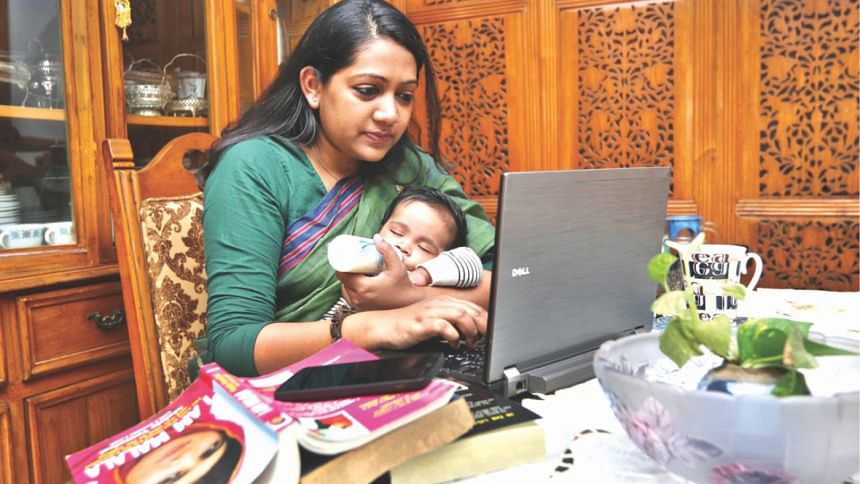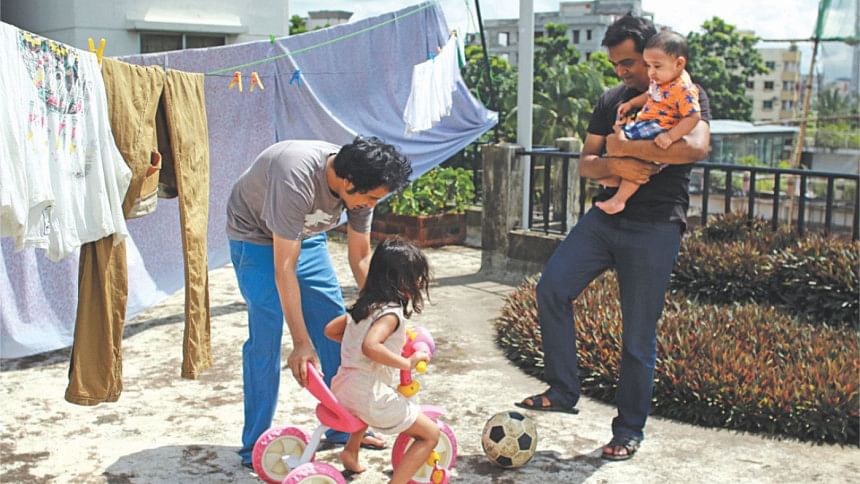Duelling the Dilemma

A Facebook post by a Pune-based banker and mother Swati Chitalkar, whose child was unwell with fever on August 16, recently made its way around the Internet. The image which depicts her hardship at work, trying to finish an urgent job while her son, who was running a high fever, lay beside her on the floor, made quite a buzz especially in the corporate world. The post that received over 25,000 shares, conveyed a strong message that if she, being a working mother could manage both her responsibilities well, why couldn't the politicians in her country wake up to the plight of street children who have to sleep on footpaths?
While the point is undoubtedly justified, this picture, once again brings the common dilemma that every working mother faces. The number of women in the workforce has been gaining prominence over the past few years, but for many working mothers, juggling work and familial responsibilities with a special focus on children, is still difficult. While these women are seriously struggling to achieve a level of professional fulfilment and financial security, they also keep facing a bigger dilemma: who will take care of the kids?
The sad fact is that in our social context, we cannot, or do not want to, put the pressure of rearing kids on anyone else but the mother. In many joint family systems, though, grandparents and other non-working family members are seen taking over the job of childcare when the mother is at work.
While being active in the workforce, when women become mothers, many of them stay true to their identity of being a 'multitasker'. Apart from taking care of the home and fulfilling every whim and fancy of their children and family members, they have to do the best each day at work as well.
After sixteen weeks of maternity leave when the women get back to their jobs, the dilemma takes a completely different turn. Experts believe that since we don't have good and affordable childcare centres available, most working women don't consider that a feasible option. There are very few organisations that have day care centres for infants and toddlers within their premises; the concept of day-care centres is still quite alien to our culture.
Many also point to the culture that is fed in part by our social institution which labels only the mother as the designated caregiver. The active role of father as a caregiver is infrequent and sometimes absent.

“Given the situation of having an inadequate child care system and also considering that most institutions in our country are very male-centric and fail to recognise the needs of a working mother, fathers should take on their fair share of caring for the family,” says Dr Sayed Saikh Imtiaz, Chairperson and Associate Professor, Department of Women and Gender Studies, University of Dhaka, Bangladesh, and Executive Director (Honorary), Center for Men and Masculinities Studies (CMMS). “When fathers start sharing responsibilities, working mothers feel less burdened and can do justice to both their roles. Spending ample time in parenting also helps men to experience the joy and satisfaction of watching their little ones grow.”
Samia Sharmin, who works at an advertising agency and is a mother of a two-year-old says that being a working mother these days is difficult and the society often ends up making them feel like they are failing in their 'core' job.
“If I bring my child with me to my office, my employer does not appreciate it as he believes it will affect my performance at work. If I leave my child with a nanny or her grandparents at home, the society frowns at me, claiming that I am a terrible mother who has prioritised my career over children,” she says. When talking about situations that get difficult to manage, she says that when her child falls sicks unexpectedly, handling both work and home becomes complicated, as very few employers would consider the needs of sudden leave requirement. “If it's so difficult to get leave during such emergencies, can you imagine how office management will react to demand for a suitable atmosphere and time for breast feeding your babies?”
In many cases, it has been observed that women are forced to give up because of zero support from work places and society in general. This also happens when a working woman has to make a choice between these two roles.
If a woman makes the choice to be a stay-at-home mother so that she can give the little beings her undivided attention and care, this also deserves tremendous respect, says Imtiaz. “Our society, including other working women, often stigmatise stay-at-home mothers, as they overlook the amount of stress and work that the mothers have to undertake. As a result, these women start feeling depressed and frustrated, as many, including their husbands, don't have any respect for the beautiful yet exhausting job that they do. They feel insecure and worry whether they will ever be able to get back to the job market,” he says.
The simple fact is that being a mother is not an easy job, and we all need to understand and cooperate with everything that this role requires.

 For all latest news, follow The Daily Star's Google News channel.
For all latest news, follow The Daily Star's Google News channel. 



Comments